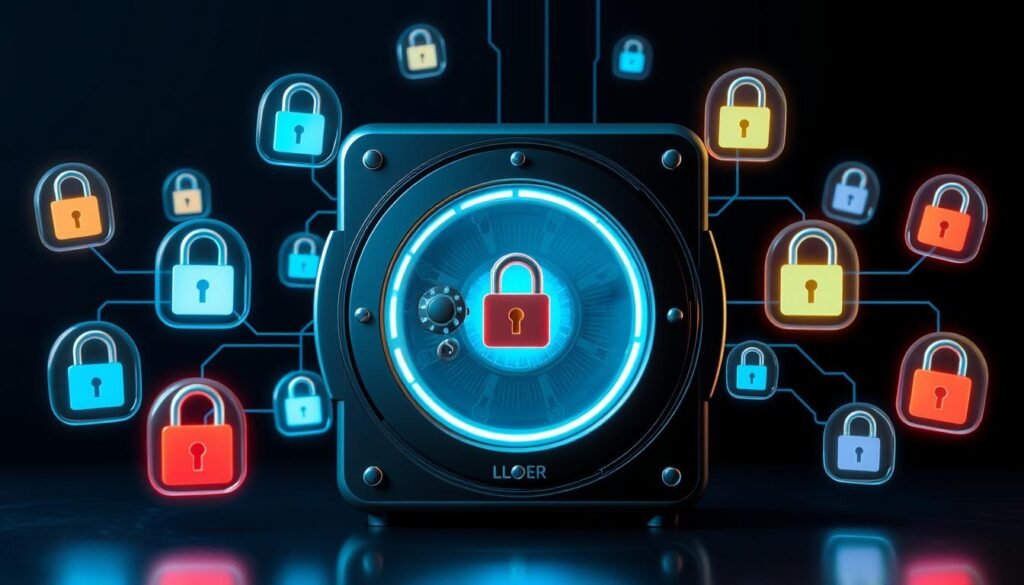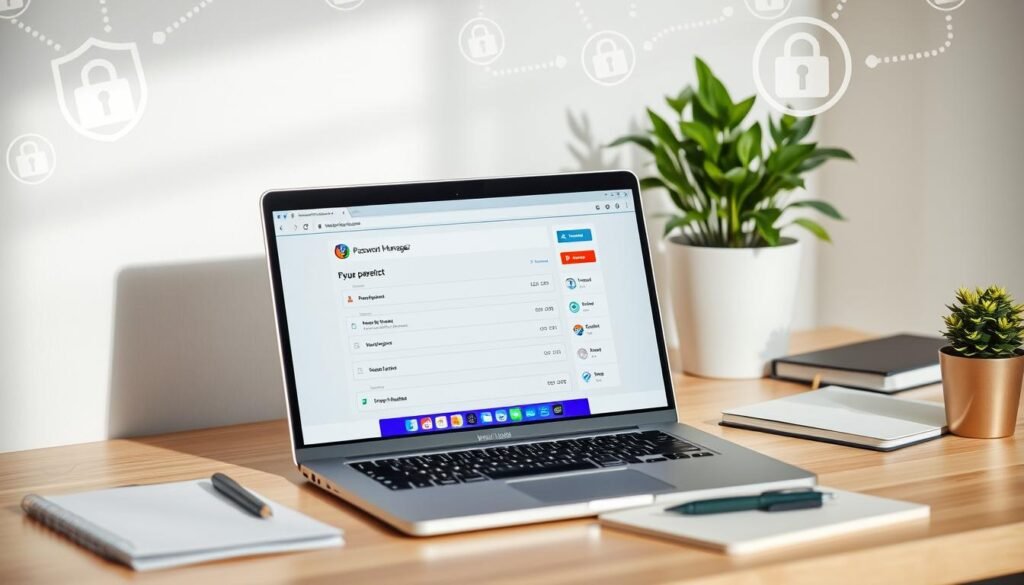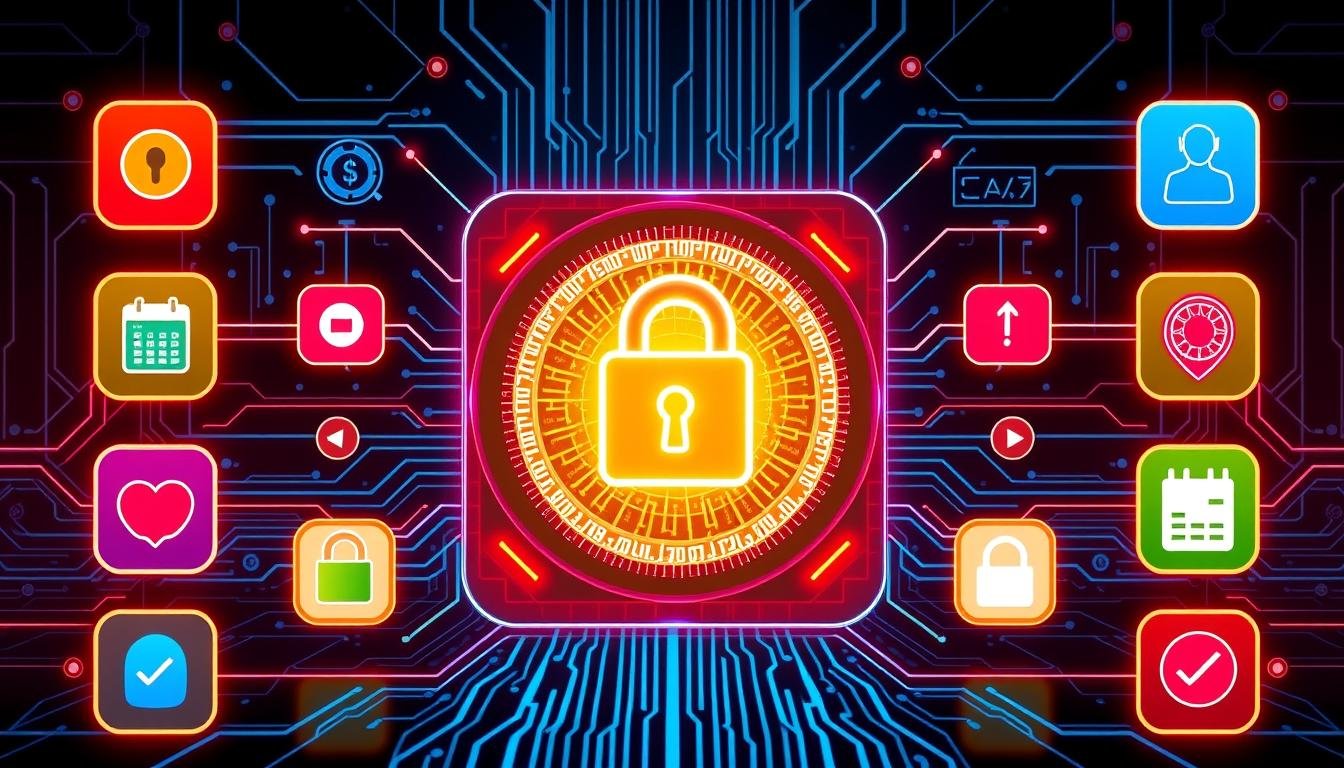In today’s digital world, keeping your online accounts safe is more important than ever. Identity theft and cybercrime are on the rise. That’s why using a password manager is key to protecting your personal info.
Password managers are your best friend against password threats. They create strong, unique passwords for every account, so you don’t have to remember them all. They keep these passwords safe in an encrypted vault, making it hard for hackers to get in.
Looking to boost your personal or business data security? Learning how to use a password manager can make a big difference. This guide will show you how to use these tools to keep your passwords safe and secure.
Key Takeaways
- Password managers generate and store unique, complex passwords, enhancing your online security.
- They offer features like password sharing, breach alerts, and integration with other security tools to further bolster your digital protection.
- Using a password manager can simplify password management while significantly improving your overall cybersecurity posture.
- Password managers like 1Password, LastPass, and Bitwarden are popular choices for securely storing and managing your login credentials.
- Enabling two-factor authentication (2FA) in conjunction with a password manager adds an extra layer of security to your accounts.
What is a Password Manager?
A password manager is a software tool that makes managing passwords easier. It creates strong, unique passwords for each account and stores them safely. These tools also offer features like password autofill and breach alerts.
Understanding the Basics of Password Managers
Using a password manager improves our online security. It saves us from remembering and typing many passwords. This reduces the chance of cyberattacks, like credential stuffing, which was common in 2022.
Password managers use strong encryption, like AES-256, to protect our data. They also have a “zero-knowledge” architecture. This means only encrypted data is stored, and the encryption keys are with the user. This boosts our data’s security and privacy.
| Feature | Description |
|---|---|
| Password Generation | Automatically create strong, unique passwords for each of your accounts. |
| Secure Storage | Store your passwords and other sensitive information in an encrypted vault. |
| Password Autofill | Automatically fill in your login credentials on websites and apps. |
| Password Sharing | Securely share passwords with trusted individuals or team members. |
| Breach Monitoring | Receive alerts if your accounts are involved in data breaches. |
| Integrations | Seamlessly integrate with other security tools, such as two-factor authentication and VPNs. |
Password managers come in different types, like apps, browser extensions, and enterprise solutions. Picking the right one is key to keeping your data safe and secure.
Importance of Strong and Unique Passwords
Creating strong, unique passwords is key to protecting your online identity and data. Weak or reused passwords leave you open to hackers. Password managers can create complex passwords that hackers can’t crack.
Using a password manager lets you have a different password for each account. This stops the risk of using the same password everywhere. It makes it hard for hackers to get into your accounts.
Experts say to avoid simple passwords like “12345” or personal info. Instead, use a mix of letters, numbers, and symbols. Or, make a long, memorable passphrase.
“The average data breach cost in 2023 was $4.45 million, underscoring the importance of strong password practices.”
Password managers also fill in your login details for you. This makes using complex passwords easy. You only need to remember one strong password for all your accounts.
Setting strong password rules is vital for better security. Also, using multi-factor authentication adds extra protection.

As threats grow, so does the need for strong passwords. Password managers help protect your digital identity. They reduce the risk of data breaches.
Benefits of Using a Password Manager
Password managers are key for better online security and easier password handling. They use encrypted storage and sync your passwords across devices. These tools are crucial for both personal and business use.
Enhanced Security Through Encryption and Zero-Knowledge Architecture
Using a password manager boosts your security. They use strong encryption, like 256-bit AES, to keep your login details safe. Plus, many follow a zero-knowledge policy. This means no one, not even the service provider, can see your passwords.
Convenience of Password Autofill and Synchronization
Password managers make logging in easy and fast. Their autofill feature lets you quickly access your accounts without remembering complex passwords. They also sync your passwords across devices. This way, you can get to your info from anywhere, anytime.
These features make password managers a must-have for digital safety. They protect you and make online tasks easier. They’re a vital part of our digital lives today.
“Using a password manager is one of the best ways to protect yourself from identity theft and other cyber threats. The enhanced security and convenience they offer are truly invaluable.”
Choosing the Right Password Manager
Choosing the right password manager is key to keeping your online accounts safe. Look for features like strong encryption, two-factor authentication, and the ability to share passwords securely. Also, make sure it syncs across all your devices.
Evaluating Key Features and Compatibility
Security is the top thing to think about. Make sure the password manager uses AES 256-bit encryption. Also, check if it offers multi-factor authentication for extra security.
It’s also important to check if the password manager works with your devices and browsers. This ensures you can easily access your passwords everywhere.
Being able to share passwords safely is another must-have. Look for a manager that lets you share securely and control who can see your passwords.
| Password Manager | Encryption | Two-Factor Authentication | Secure Sharing | Cross-Device Sync | Pricing |
|---|---|---|---|---|---|
| Bitwarden | AES 256-bit | Yes | Yes | Yes | Free, $10/year Premium |
| 1Password | AES 256-bit | Yes | Yes | Yes | $36/year Individual, $60/year Family |
| Dashlane | AES 256-bit | Yes | Yes | Yes | $60/year Individual, $90/year Family |
By looking at these features and compatibility, you can pick a password manager that fits your needs. This will help keep your online accounts safe.
How to Create and Manage Passwords Securely: A Guide to Using Password Managers
Keeping strong, unique passwords for all your accounts can be hard. But, a password manager makes it easier and safer. It generates, stores, and fills in your login details, so you don’t have to remember long, complex passwords.
Using a password manager helps you create strong, unique passwords for each account. Research by tech.co shows the average person has 100 passwords to manage. A password manager creates long, complex passwords that are hard to crack.
Creating secure passwords is crucial. The World Economic Forum found that an eight-digit password can be cracked instantly. But, a 12-character password takes 3 weeks. Adding numbers, symbols, and uppercase letters makes a password uncrackable for 30,000 years.
Password managers also make updating your passwords easy. This is key to keeping your accounts safe from breaches or unauthorized access. With a password manager, updating your passwords is quick and simple.
Another great feature of password managers is sharing passwords securely. Whether it’s for work or family, they offer encrypted, controlled sharing. This keeps your sensitive information safe.
When picking a password manager, look for features like two-factor authentication and breach monitoring. Also, make sure it works with your devices and browsers. Following these best practices boosts your online account security and protects your data from threats.

“Password managers are considered the best option for managing passwords, offering enhanced security through encryption and zero-knowledge architecture, as well as convenience through password autofill and synchronization.”
In summary, using a password manager is key to securing your online accounts. By managing your passwords well, you can rest easy knowing your sensitive info is safe.
Setting Up and Using a Password Manager
Managing passwords is key in today’s digital world. We have many online accounts to keep track of. Password managers make this easier. You create an account and a strong master password to unlock your vault of passwords.
Account Creation and Master Password Setup
To start, sign up with a trusted password manager. You’ll need your name and email. Then, create a strong master password. It should be 12 characters long, with letters, numbers, and symbols. This password is the only one you’ll remember, giving you access to all your passwords.
Generating and Storing Passwords
- After setting up, the manager helps you create strong passwords for each account. These are much safer than your old passwords.
- The manager keeps these passwords safe. You can easily get and use them without remembering each one.
Using a password manager makes managing your passwords easier. It boosts your online security and keeps your login details ready when you need them.
| Feature | Benefit |
|---|---|
| Password Generation | Password managers create random, secure passwords. |
| Secure Storage | They use 256-bit AES encryption to keep your data safe. |
| Accessibility | Online managers store your vault on servers, making it easy to access. |

“By implementing password managers in the workplace and providing training, organizations can ensure standardized and secure password management practices for their staff.”
Password Sharing and Collaboration
Password managers are great for more than just personal use. They help you share passwords safely with family or work colleagues. This is thanks to strong encryption, which keeps your passwords safe even when shared.
Using a password manager’s secure sharing tools lets you work together without risking your account security. You don’t have to worry about your sensitive info getting into the wrong hands.
Secure Password Sharing with Encryption
Encryption is crucial for safe password sharing. LastPass, 1Password, Dashlane, and TeamPassword use top-notch encryption to protect your passwords. This keeps your info safe, both when it’s being sent and when it’s stored.
These password managers also have cool features like one-time password sharing and access controls. You can share passwords just when you need to and take them back when you’re done. This keeps your accounts safe while making teamwork easier.
| Password Manager | Secure Password Sharing Features |
|---|---|
| LastPass | Shared Folders, One-Time Passwords, Granular Access Controls |
| 1Password | Shared Vaults, Secure Document Sharing, Team Management |
| Dashlane | Secure Sharing, Password Sharing Notifications, Audit Trails |
| TeamPassword | Shared Logins, One-Time Passwords, Detailed Access Logs |
Using password sharing with password managers, secure password sharing, encrypted password sharing, and password manager collaboration features is key. It lets your team or family access what they need safely. This way, you keep your accounts and sensitive info secure.
Dark Web Monitoring and Breach Alerts
Keeping up with cybercriminals is key in today’s digital world. Dark web monitoring is a powerful tool to stay ahead. Many advanced password managers now scan the dark web for your personal info or login details.
If a breach is found, these managers quickly alert you. This lets you act fast to protect your accounts and prevent identity theft or data loss. This feature is a big plus in the password manager’s security package, helping you outsmart cybercriminals.
This feature is very important. In 2022, billions of personal info pieces were leaked to the dark web. There were 817 data breaches in just the first half of the year. Companies often don’t tell people about data breaches quickly, leaving them at risk of identity theft or financial fraud.
“Dark Web alerts notify individuals when their sensitive information like credit card numbers, phone numbers, login credentials, email accounts, home addresses, or other PII surfaces on the Dark Web.”
Services like Aura scan for leaked personal data and public records. They alert you when they find leaks. This is key for keeping your digital identity safe and preventing financial losses.
Comprehensive Security through Dark Web Monitoring
Dark web monitoring does more than just find breaches. It boosts your overall security. Regular dark web monitoring can reduce financial loss, protect your intellectual property, and build trust. It also meets strict rules like GDPR and HIPAA.
As cyber threats grow and remote work adds new risks, a proactive password management solution is crucial. Having dark web monitoring helps you stay ahead and protect your digital assets.
Integrating Password Managers with Other Security Tools
Password managers are a strong base for better online security. They work best when paired with other security tools. Two-factor authentication (2FA) and virtual private networks (VPNs) add extra protection to your digital life.
Two-Factor Authentication: An Extra Layer of Security
Setting up two-factor authentication is key to keeping your info safe. It asks for a password and a one-time code or biometric check. This makes it much harder for hackers to get into your accounts, even if they have your password.
Linking your password manager with 2FA adds an extra layer of security. Many top password managers work well with 2FA providers. This makes it simple to set up and manage this extra security.
Encrypted Connections with Virtual Private Networks
Virtual private networks (VPNs) are crucial for protecting your online activities and data. They encrypt your internet traffic and send it through a secure server. This keeps your sensitive info safe, even on public Wi-Fi. Using a VPN with your password manager makes your digital life even safer.
Accessing your password vault through a VPN connection means your login details and other sensitive data are protected. This integration helps reduce risks from public networks. It ensures your password manager is a secure way to access your online accounts.
By using password managers with 2FA and VPNs, you greatly improve the enhanced online security of your digital accounts. This gives you more peace of mind in our cyber-focused world.
Best Practices for Password Management
In today’s digital world, keeping our online accounts safe is key. A big part of this is using the best ways to manage our passwords. This means checking our passwords often to find weak or reused ones and changing them when needed.
Regular Password Audits and Updates
Password managers help us check our passwords’ strength and health. They spot passwords that are too short, simple, or used too many times. Using these tools helps us fix any weak spots and keep our passwords strong.
It’s also important to change our passwords regularly. Experts say our passwords should be at least 6-8 characters long. They should mix uppercase and lowercase letters, numbers, and special characters. This makes our passwords harder to guess.
By following these steps, we can keep our online world safe. Regularly checking and updating our passwords is a big part of keeping our digital lives secure.
| Password Management Best Practices | Key Benefits |
|---|---|
| Regular password audits | Identify weak or reused credentials |
| Prompt password updates | Maintain robust and secure login credentials |
| Leveraging password manager features | Assess password strength and facilitate seamless updates |
| Creating strong, unique passwords | Enhance resistance to brute-force attacks |
By focusing on these password management best practices, we can protect our digital selves. This ensures our online accounts stay safe.
Conclusion
In today’s digital world, using a password manager is key to keeping your online accounts safe. They help by making strong, unique passwords and storing them securely. They also offer extra safety like two-factor authentication and dark web monitoring.
This makes it much harder for hackers to get into your accounts. By following the tips in this guide, you can use password managers to keep your passwords safe. This protects your digital identity and keeps your online activities secure.
Password managers are very important. They solve the problems of weak, duplicate, or stolen passwords. They also make it unnecessary to change passwords all the time.
New technologies like biometric authentication and passwordless methods are being added to password managers. This is changing how we think about online security. By picking a good password manager with extra security features, you can keep your digital identity safe.
As we move forward in the digital world, keeping your passwords safe is crucial. Password managers give you the tools to do this. They help you protect your online activities and keep your digital identity safe.
With the advice from this article, you can manage your passwords securely. This ensures your online security and gives you peace of mind.






